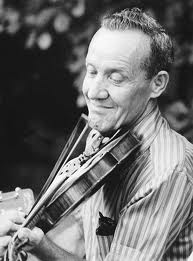Annotation:Brushy Run: Difference between revisions
No edit summary |
No edit summary |
||
| (One intermediate revision by the same user not shown) | |||
| Line 1: | Line 1: | ||
{{TuneAnnotation | {{TuneAnnotation | ||
|f_tune_annotation_title=https://tunearch.org/wiki/Annotation:Brushy_Run > | |f_tune_annotation_title=https://tunearch.org/wiki/Annotation:Brushy_Run > | ||
|f_annotation=[[File:douglas.jpg|250px|thumb|left|Wilson Douglas]]'''BRUSHY RUN'''. American, Reel (cut time). USA, West Virginia. G Major. Standard (French Carpenter, Art Stamper) or DGdg (Harvey Sampson) tunings (fiddle). AB. Clay County, West Virginia, fiddler [[biography:Wilson Douglas]] identifies the locale of this tune as "over beyond Widen. It was just a big holler, with so much underbrush--some old fiddler was bacheloring there and he just composed this and he called it the 'Brushy Run.' Just a bushy ravine, so to speak. (French) Carpenter (1899-1965) could really play that. Where these young fiddlers get lost is in the bowing over the high part. You do it with the bow. You don't do it with the notes at all!" (interview with Nancy McClellan). Douglas also said it was a Carpenter family tune composed some time around the time of the American Civil War. According to Kerry Blech, Ward Jarvis (W.Va., Ohio) learned the tune from eastern Kentucky fiddler Ed Haley, and that Jarvis played it in standard tuning. | |f_annotation=[[File:douglas.jpg|250px|thumb|left|Wilson Douglas]]'''BRUSHY RUN'''. American, Reel (cut time). USA, West Virginia. G Major. Standard (French Carpenter, Art Stamper) or DGdg (Harvey Sampson) tunings (fiddle). AB. Clay County, West Virginia, fiddler [[biography:Wilson Douglas]] identifies the locale of this tune as "over beyond Widen. It was just a big holler, with so much underbrush--some old fiddler was bacheloring there and he just composed this and he called it the 'Brushy Run.' Just a bushy ravine, so to speak. (French) Carpenter (1899-1965) could really play that. Where these young fiddlers get lost is in the bowing over the high part. You do it with the bow. You don't do it with the notes at all!" (interview with Nancy McClellan). Douglas also said it was a Carpenter family tune composed some time around the time of the American Civil War. According to Kerry Blech, Ward Jarvis (W.Va., Ohio) learned the tune from eastern Kentucky fiddler Ed Haley, and that Jarvis played it in standard tuning. Douglas's and Ed Haley's versions are also nearly identical. | ||
|f_source_for_notated_version=Danny Gardella [Phillips]. | |f_source_for_notated_version=Danny Gardella [Phillips]. | ||
|f_printed_sources=Phillips ('''Traditional American Fiddle Tunes, vol. 1'''), 1994; p. 39. | |f_printed_sources=Phillips ('''Traditional American Fiddle Tunes, vol. 1'''), 1994; p. 39. | ||
|f_recorded_sources=Augusta Heritage Recordings AHR-004C, Harvey Sampson and the Big Possum String Band - "Flat Foot in the Ashes" (1986/1994. Learned by Calhoun County, W.Va., fiddler Harvey Sampson from his father). Cassette C-7625, Wilson Douglas - "Back Porch Symphony." Rounder 0047, Wilson Douglas - "The Right Hand Fork of Rush's Creek" (1975). Rounder 1131/1132, Ed Hayley - "Forked Deer, vol. 1" (1997). | |f_recorded_sources=Augusta Heritage Recordings AHR-004C, Harvey Sampson and the Big Possum String Band - "Flat Foot in the Ashes" (1986/1994. Learned by Calhoun County, W.Va., fiddler Harvey Sampson from his father). Cassette C-7625, Wilson Douglas - "Back Porch Symphony." Rounder 0047, Wilson Douglas - "The Right Hand Fork of Rush's Creek" (1975). Rounder 1131/1132, Ed Hayley - "Forked Deer, vol. 1" (1997). VT-2003, Rhys Jones, Jeff Miller, Jim Nelson - "Mississippi Square Dance, vol. 2" (2004). | ||
|f_see_also_listing=Hear French Carpenter's field recording at Slippery Hill [https://www.slippery-hill.com/recording/brushy-run]<br> | |f_see_also_listing=Hear French Carpenter's field recording at Slippery Hill [https://www.slippery-hill.com/recording/brushy-run]<br> | ||
Hear Wilson Douglas's 1973 field recording by Kevin Delaney at Berea Sound Archives [https://soundarchives.berea.edu/items/show/971]<br> | Hear Wilson Douglas's 1973 field recording by Kevin Delaney at Berea Sound Archives [https://soundarchives.berea.edu/items/show/971]<br> | ||
Latest revision as of 04:15, 5 March 2024
X:1 T:Brushy Run F:From the playing of fiddler Ed Haley (1885-1951, east Ky./W.Va.) M:C| L:1/8 R:Ree D:Rounder 1131/1132, Ed Haley - "Forked Deer" (1997) D:https://www.slippery-hill.com/recording/brushy-run-0 Z:Transcibed by Andrew Kuntz K:G BABc d2d2|edef g2g2|BABc d2de|AABG E2D2| BABc d2d2|edef gage|BGAG (3EFE D2| GBAF G2G2:| |:+slide+BAGD E2D2|efgd e-fgd|+slide+BAGD EDE-F|GBAF G2G(_B| =B)AGD E2D2|efgd e-fgd|+slide+BAGD EDE-F|GBAF G2G2:|


